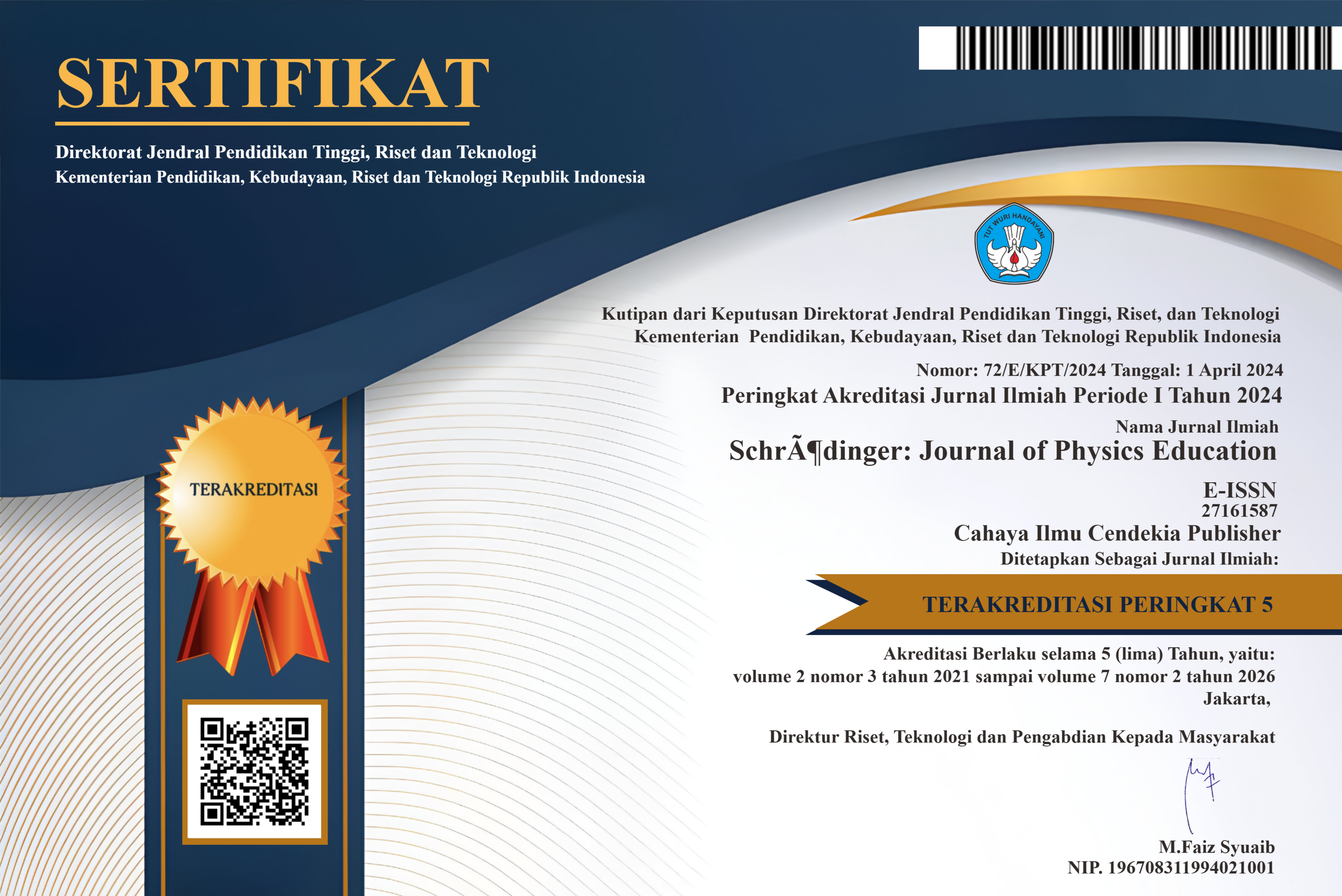Improving Students’ Performance in Resolution of Vectors Using PhET Interactive Simulations
Abstract
Purpose of the study: The paper examines the use of Physics Education Technology (PhET) simulations to enhance the academic performance of third-year science students at Kumasi Wesley Girls' High School.
Methodology: The research used teacher-made tests, questionnaires, and informal observations to collect data. Ninety candidates (90 students) were selected from the third-year science population using a cluster sampling. The questionnaire, pre-evaluation, and post-evaluation tests on vectors were analyzed using descriptive statistics.
Main Findings: The study found that PhET-based teaching significantly improved the performance of third-year science students in vector resolution, with a paired mean difference of 6.30 compared to pre-treatment tests. The questionnaire analysis of 90 students revealed that 85.6% initially found vector applications difficult, and 80% felt the teaching methods were unvaried and boring. After the PhET lab simulation intervention, 89% of students were enthusiastic about using simulations in future activities, and 78% reported an improved understanding of resultant vectors. The study indicates that PhET simulations significantly enhance student engagement and comprehension compared to traditional lecture teaching methods.
Novelty/Originality of this study: The study explores using Physics Education Technology (PhET) simulations in Ghanaian high school Kumasi Wesley Girls' High School to improve vector resolution learning. The interactive approach demystifies complex concepts, and the study quantifies its impact on students' academic performance. It also provides insights into students' attitudes towards physics education
References
M. Carli, S. Lippiello, O. Pantano, M. Perona, and G. Tormen, "Testing students ability to use derivatives, integrals, and vectors in a purely mathematical context and in a physical context," Physical Review Physics Education Research, vol. 16, no. 1, p. 010111, 2020, doi: 10.1103/PhysRevPhysEducRes.16.010111.
D. S. Kumar, M. Pastor, and P. Kumar, Introduction to Mechanics. Academic Guru Publishing House, 2024.
E. Zenon, J. Boffenmyer, M. Elaasar, and S. Vides, "Linear Motion," Exploring the Physical World: An Updated and Expanded Introduction To the Physical Sciences, 2024.
J. W. Giancaspro, D. Arboleda, N. J. Kim, S. J. Chin, J. C. Britton, and W. G. Secada, "An active learning approach to teach distributed forces using augmented reality with guided inquiry," Computer Applications in Engineering Education, vol. 32, no. 2, p. e22703, 2024, doi: 10.1002/cae.22703
J. V. Vidal, P. M. Carneiro, and M. P. S. dos Santos, "A complete physical 3D model from first principles of vibrational-powered electromagnetic generators," Applied Energy, vol. 357, p. 122387, 2024, doi: 10.1016/j.apenergy.2023.122387.
T. Markić and W. Kaufmann, "Modeling and design of concrete hinges under general loading," Structural Concrete, vol. 24, no. 4, pp. 5122-5149, 2023, doi: 10.1002/suco.202201110.
N. Jayaprakash et al., "Organ-and function-specific anatomical organization of vagal fibers supports fascicular vagus nerve stimulation," Brain stimulation, vol. 16, no. 2, pp. 484-506, 2023, doi: 10.1016/j.brs.2023.02.003.
WAEC, "The West African Examination Council Chief Examination Report 2011.," 2011.
WAEC, "The West African Examination Council Chief Examiners Report 2015.," 2015.
WAEC, "The West African Examination Council Chief Examiners Report 2018.," 2018.
R. N. Kumi-Manu, C. Owusu-Fordjour, R. O. Asante, and E. Konadu, "Level of exposure and effective usage of biology laboratory facilities by teachers: Evidence from selected senior high schools in central region, Ghana," International Journal of Academic Research and Reflection, vol. 12, no. 1, 2024.
C. Holly, S. Porter, T. R. Vitale, and M. Echevarria, "Grading participation in the classroom: The assumptions, challenges, and alternatives," Teaching and Learning in Nursing, vol. 19, no. 1, pp. 27-33, 2024, doi: 10.1016/j.teln.2023.06.020.
T. W. Chinaka, "The effect of PhET simulation vs. phenomenon-based experiential learning on students’ integration of motion along two independent axes in projectile motion," African Journal of Research in Mathematics, Science and Technology Education, vol. 25, no. 2, pp. 185-196, 2021, doi: 10.1080/18117295.2021.1969739.
GNA. "Ranking for best senoir high schools in Ghana." Ghana News Agency. https://gna.org.gh/ (accessed.
L. Geewe, "Vector algebra in augmented reality: Insights from learning activity with engineering students," ed, 2024.
O. Pranata, "Students’ understanding of vector operations: With and without physics education technology simulation," Journal of Mathematics and Science Teacher, vol. 4, no. 3, 2024, doi: 10.29333/mathsciteacher/1463.3
Y. Ndikumana, L. R. Mugabo, and A. Nsabimana, "Teaching and learning biotechnology at University of Rwanda-college of science and technology: The assessment of teaching practices and learning styles for biotechnology concepts understanding," International Journal of Learning, Teaching and Educational Research, vol. 23, no. 1, pp. 469-501, 2024, 10.26803/ijlter.23.1.23.
A. N. Yunzal Jr and L. F. Casinillo, "Effect of physics education technology (PhET) simulations: evidence from stem students’ performance," Journal of Education Research and Evaluation, vol. 4, no. 3, pp. 221-226, 2020, doi: 10.23887/jere.v4i3.27450.
H. J. Banda and J. Nzabahimana, "The impact of physics education technology (PhET) interactive simulation-based learning on motivation and academic achievement among malawian physics students," Journal of Science Education and Technology, vol. 32, no. 1, pp. 127-141, 2023, doi: 10.1007/s10956-022-10010-3.
Cynthia Jebuni-Adanu et al., "Utilizing physics education technology (PhET) for improving students' understanding of energy conversion and conservation in a senior high technical school," Journal of Education and Practice, 2023, doi: 10.7176/jep/14-8-06,
N. C. Masruroh, A. Vivianti, P. M. Anggraeni, S. N. Waroh, and N. Wakhidah, "Application of PhET simulation to electrical circuits material in online learning," INSECTA: Integrative Science Education and Teaching Activity Journal, vol. 1, no. 2, pp. 130-142, 2020.
M. L. Meadows and J. C. Caniglia, "Using PhET simulations in the mathematics classroom," The Mathematics Teacher, vol. 112, no. 5, pp. 386-389, 2019, doi: 10.5951/mathteacher.112.5.0386.
M. G. Saudelli, R. Kleiv, J. Davies, M. Jungmark, and R. Mueller, "PhET simulations in undergraduate physics: Constructivist learning theory in practice," Brock Education Journal, vol. 31, no. 1, 2021, doi: 10.26522/brocked.v31i1.899.
N. Siu-Ping and F. Chak-Him, "Flipped classroom with simulation assists students learning the vector knowledge," Journal of Education and Training Studies, vol. 8, no. 12, pp. 35-48, 2020, doi: 10.11114/jets.v8i12.5093.
S. Samijo and D. D. Romadona, “A study of science process skills on simple pendulum materials”, Sch. Jo. Phs. Ed, vol. 4, no. 1, pp. 24-29, 2023, doi: 10.37251/sjpe.v4i1.494.
D. Masniari. S, B. T. Turaqulov, and J. Kigo, “Attitude of students’ interest in learning physics ”, Sch. Jo. Phs. Ed, vol. 4, no. 3, pp. 59-63, 2023, doi: 10.37251/sjpe.v4i3.697.
W. N. Hidayat, R. C. K, and J. A. S. Alé, “Analysis of physics students’ conceptual understanding of image formation in lenses”, sch. jo. phs. ed, vol. 5, no. 2, pp. 62-67, 2024, doi: 10.37251/sjpe.v5i2.882.
O. D. Pranata, "Enhancing conceptual understanding and concept acquisition of gravitational force through guided inquiry utilizing PhET simulation," Sainstek: Jurnal Sains dan Teknologi, vol. 15, no. 1, pp. 44-52, 2023, doi: 10.31958/js.v15i1.9191.
R. Haryadi and H. Pujiastuti, "PhET simulation software-based learning to improve science process skills," in Journal of Physics: Conference Series, vol. 1521, 2020, doi: 10.1088/1742-6596/1521/2/022017.
R. Luckin and W. Holmes, "Intelligence unleashed: An argument for AI in education," 2016.
R. L. Mallari and G. D. Lumanog, "The effectiveness of integrating PhET interactive simulation-based activities in improving the student’s academic performance in science," International Journal for Research in Applied Science and Engineering Technology, vol. 8, no. 9, pp. 1150-1153, 2020, doi: 10.22214/IJRASET.2020.31708
A. Susilawati, Y. Yusrizal, A. Halim, M. Syukri, I. Khaldun, and S. Susanna, "The effect of using physics education technology (PhET) simulation media to enhance students’ motivation and problem-solving skills in learning physics," Jurnal Penelitian Pendidikan IPA, vol. 8, no. 3, pp. 1157-1167, 2022, doi: 10.29303/jppipa.v8i3.1571.
D. Olugbade, S. S. Oyelere, and F. J. Agbo, "Enhancing junior secondary students' learning outcomes in basic science and technology through PhET: A study in Nigeria," Education and Information Technologies, vol. 29, pp. 14035-14057, 2024, doi: 10.1007/s10639-023-12391-3.
Copyright (c) 2024 Isaac Kwesi Acquah, Bright Owusu Ansah, Michael Gyan, Desmond Appiah, Robert Wilson, Charles Enoch Mensah1

This work is licensed under a Creative Commons Attribution 4.0 International License.
Authors who publish with this journal agree to the following terms:
- Authors retain copyright and acknowledge that the Schrödinger: Journal of Physics Education is the first publisher licensed under a Creative Commons Attribution 4.0 International License.
- Authors are able to enter into separate, additional contractual arrangements for the non-exclusive distribution of the journal's published version of the work (e.g., post it to an institutional repository or publish it in a book), with an acknowledgment of its initial publication in this journal.
- Authors are permitted and encouraged to post their work online (e.g., in institutional repositories or on their website) prior to and during the submission process, as it can lead to productive exchanges and earlier and greater citation of published work.







.png)
.png)








.png)
.png)
.png)







